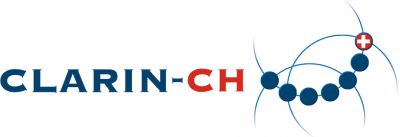Content
CLARIN-CH Working Groups
 Description
Description
CLARIN-CH working groups (WGs) are groups of researchers (i.e. CLARIN-CH members, other national and European scholars) that are interested in language-, resource- and infrastructure-related topics.
They offer the opportunity to work together with peers in a formalized and sustainable environment.
CLARIN-CH WGs are self-organized and work in a strategic area that is defined by CLARIN-CH scientific community in a bottom-up manner. They benefit of the support of the CLARIN-CH Consortium.
All WGs have the purpose to bring together expertise on a specific topic, to submit joint research projects, ultimately, to serve the community, which can be scholarly and technical.
In the long-term, the main goal of the CLARIN-CH WGs is to build and to extend the CLARIN infrastructure, for instance, by creating one or more CLARIN Knowledge centres.
To create and to run a CLARIN-CH WG:
(1) Discuss your interest with other research peers.
(2) Determine two leaders: chair and co-chair. The WG leaders are responsible of the functioning of the WG and set the short-term and mid-term objectives, the way in which the objectives will be attained, the frequency of the meetings, etc. The leaders are also responsible for maintaining the contact with the CLARIN-CH Consortium.
(3) Write a short description of its goals and objectives. All descriptions should be sent to the National Coordination Office and will be posted on the CLARIN-CH website.
The CLARIN-CH Consortium supports the WGs as follows:
✔️It ensures the communication among the CLARIN-CH WGs, and it informs the WG leaders of CLARIN-CH and CLARIN ERIC seed funding opportunities, as well as other Swiss and European funding instruments.
✔️It works together with the scientific community to develop a national network suitable for the needs of every interested sub-discipline.
Current Working Groups
1. ORD projects for linguistic data
This WG aims to provide a framework for collaboration among the following ORD proposals in linguistics:
(i) Upgrading the linguistic ORD-ecosystem Up-LORD (main applicant: UZH, PI: Noah Bubehofer; other participants: CLARIN-CH and Zurich University Library)
(ii) Swiss-AL: Linguistic ORD Practices for Applied Sciences (main applicant ZHAW, PI: Julia Krasselt, with the support of the CLARIN-CH Consortium)
(iii) Data-sharing skills in corpus-based research on talk-in-interaction (main applicant: USI, PI: Johanna Miecznikowski-Fuenfschilling, ther participants: UNIL, UNIBAS and UNINE).
The kick-off meeting of the WG is planned for Thursday May 11, 2023.
More information about the objectives of this WG will be provided soon. Are you interested in joining the WG? Write to the CLARIN-CH Coordination Office.
2. Management of Sensitive and Personal data: Ethical and Legal aspects for Linguistic data in Switzerland
This WG aims to produce documentation about the management of sensitive data and legal aspects for linguistic data in Switzerland. For this, the work will be done in two phases. First, it will collect questions from the community (discipline-specific) about managing sensitive data and legal aspects. Second, it will find answers to these questions by gathering researchers and professionals who deal with such legal aspects (e.g. from grant and research support offices, from the legal services of higher education institutions, from the cantonal legal services). As deliverables, this WG will produce documentation useful for the entire scientific community in linguistics (both generalised and discipline-specific documentation) (e.g. what questions you need to ask yourself to better understand what type of data you have and to tackle them) and share them with the scientific community.
Are you interested in joining this WG?
Register here and we will keep you informed of all future activities.
The kick-off event of this national WG will take place on September 29th from 8:30-12:30 on Zoom. The event will focus on data collection, protection and preservation and their associated procedures, with respect to different types of linguistic data (e.g., multimodal, historical, experimental, sociolinguistics, data from social media, data from different age groups). Read more and register here.
How does CLARIN ERIC deal with legal issues?
If you are interested in this topic, please also check the CLARIN ERIC documentation platform about legal issues related to research, especially in the Social Sciences and Humanities domain, which includes an Introduction to Copyright and Related Rights, Licensing Practice and Personal Data Protection. To go futher into learning about the CLARIN Committee for Legal and Ethical Issues, please read Kamocki, Paweł, Kelli, Aleksei and Lindén, Krister. The CLARIN Committee for Legal and Ethical Issues and the Normative Layer of the CLARIN Infrastructure. In CLARIN: The Infrastructure for Language Resources, edited by Darja Fišer and Andreas Witt, Berlin, Boston: De Gruyter, 2022, pp. 457-480.
In 2020, three members of the CLARIN Committee for Legal and Ethical Issues teamed up with the DARIAH ELDAH Ethics and Legality in Digital Arts and Humanities Working Group to create the DARIAH ELDAH Consent Form Wizard.7 This online tool enables researchers to quickly generate a GDPR-compliant consent form for collecting personal data for research purposes, but which can also be used, for example, for creating mailing lists or organizing academic events. Currently the tool is available in English, German, Italian and Croatian, although there are plans to have it translated to other languages.
3. Research infrastructures for Argumentation and Rhetoric
This WG will gather experts in Argumentation and Rhetoric around questions such as what research infrastructures needed for research in argumentation and rhetoric.
More information about this WG will be provided soon. Are you interested in joining? Write to the CLARIN-CH Coordination Office.
